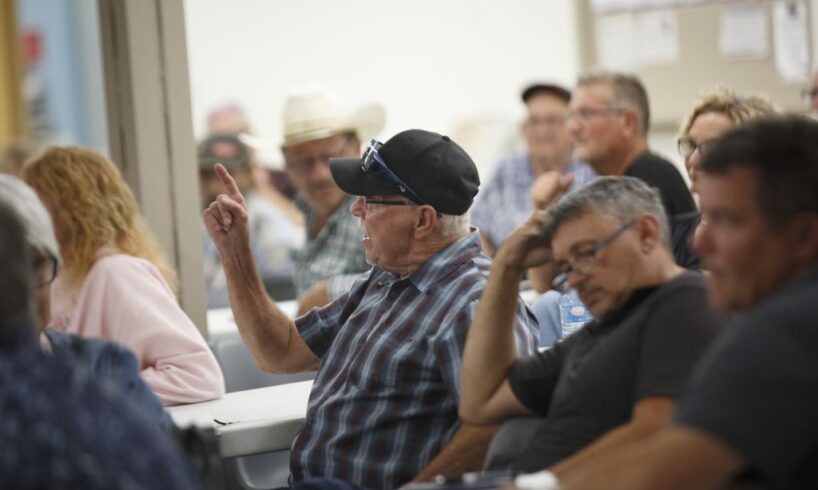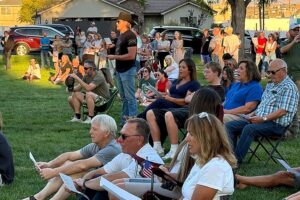
If Vitor Marciano, the chief of staff to Alberta’s energy minister, thought he was going to get a warm reception at a recent meeting in the village of Warburg, he was mistaken.
Marciano faced jeers and doubt as he tried to sell a largely rural crowd on the government’s latest plan to deal with a cascade of problems caused by the oil and gas sector.
Around 100 people were in the Warburg Community Hall on Sept. 9 to hear Marciano talk about the Mature Asset Strategy. It’s a series of recommendations the government says will help with the oil and gas industry’s unpaid taxes and leases, which include tens of thousands of inactive wells and environmental liabilities of almost $38 billion, according to the Alberta Energy Regulator.
He was joined, unexpectedly, by the author of that strategy, Dave Yager, a board member of the regulator and a special advisor to Premier Danielle Smith. Yager was not advertised as a guest.
Vitor Marciano, chief of staff to Alberta’s energy minister, spoke to a crowd gathered to discuss the province’s oil and gas problem. His reception was a chilly one.
“The mature asset strategy will not give companies taxpayer dollars to clean up their assets,” Marciano said, summarizing his message to the crowd.
“It will,” came a voice from the back of the room.
“The mature asset strategy will not end or diminish the Orphan Well Association,” Marciano said, referring to the industry-funded association meant to deal with wells left behind by bankrupt companies.
“It will,” came the same voice.
“The mature asset strategy does not violate the polluter-pay principle,” Marciano continued.
“It will,” came the reply.
That disagreement set the stage for the night, though it was one of the quieter exchanges, with the crowd often interrupting and arguing with Marciano. The level of frustration was high, with what many see as regulatory failure and government complicity — a view that Marciano himself largely agreed with, but which he promised would change.
At the well cleanup meeting in Warburg, Alta., farmers, landowners and others gathered to hear a presentation from a senior staffer at the Alberta government. Many shouted their frustrations.
Many in the crowd remained unconvinced, and Marciano’s own presentation didn’t help.
Twice in the early stages of his talk, Marciano was interrupted by audience members representing organizations that were mentioned in Marciano’s slides. They did not agree with his characterizations of facts.
Surface rights groups were involved from the first meeting to discuss a path forward, according to Marciano. Not true, according to William Heidecker, a rancher and the president of the Alberta Surface Rights Federation, who said a request to be included was rebuffed. The Rural Municipalities of Alberta are working on solutions within the new strategy to tackle unpaid taxes, according to Marciano. Not true, according to Wyatt Skovron, the general manager of policy and advocacy for the association, who made clear the organization wants nothing to do with the new plan.
Jennifer Stephenson, a local landowner, sparred with Marciano over not receiving a company’s lease payments on her land. Marciano said she needs to apply for reimbursement from the government.
“It’s still our tax dollars,” she said. “That’s not good enough.”
Attendees disagreed about facts: According to the Alberta Surface Rights Federation, its members were not invited to the first meetings on the government’s strategy as stated by Marciano. The Rural Municipalities of Alberta are working on solutions within the proposal, according to Marciano, but Wyatt Skovron (standing, right), the association’s general manager of policy and advocacy, said it wants nothing to do with the new strategy.
In the room, there was palpable anger with the government and with the regulator for not enforcing existing rules. Grievances included wells being transferred to financially unstable companies, inspections that don’t happen, wells that aren’t closed and cleaned, payments that aren’t made, as well as the complaint that licences aren’t pulled and bad actors removed.
Many in the room are also fighting to get land lease payments — the money owed to farmers and landowners by companies with wells on their land.
Marciano and Yager’s message was: yes, mistakes were made. Now, please trust that we’re going to fix them.
Proposed strategy to deal with oil and gas wells would see government take over old wells itself
It wasn’t just locals at the meeting, a sign of the scale of Alberta’s problems and the controversy of the government’s plans.
Rakhi Pancholi, deputy leader of the Alberta NDP was there, as was Paul McLauchlin, the former president of the Rural Municipalities of Alberta. There was Susanne Calabrese, a lawyer for Ecojustice who is pushing for an ethics investigation against Yager, along with her client Dwight Popowich, and more.
Municipalities are owed $254 million in outstanding property taxes from oil and gas companies, while another $200 million has been written off in the past decade, never to be collected. According to the Rural Municipalities of Alberta, more than $100 million of the outstanding taxes are owed by 201 companies that are still operating.
There are nearly 80,000 inactive wells scattered across the province, some of which haven’t produced any oil or gas for decades, often leaching pollution in the ground and the air.
Landowners with failing companies on their properties have to wait months for the government to reimburse unpaid leases. The government paid more than $150 million to cover lease obligations for private companies between 2010 and 2024 and in that time has recovered less than one per cent from those companies.
Landowners with failing companies on their properties have to wait months for the government to reimburse unpaid leases. The government paid more than $150 million to cover lease obligations for private companies between 2010 and 2024 and in that time has recovered less than one per cent from those companies.
The mature asset strategy — developed to respond to many of these issues — has been controversial since it was first leaked to the media in March. Particularly controversial has been the possibility of creating a government entity that would take ownership of aging wells owned by derelict companies, dubbed “HarvestCo.” That and other proposals in the strategy could be government policy this fall.
Those wells would either be transferred to the Orphan Well Association, sold to different private operators to run or be taken over by HarvestCo to wring whatever wealth is left in the ground, with the goal of funding their cleanup.
Critics say it shifts all the risk onto taxpayers, while Marciano argues it would be an effective way for the government to reap financial rewards from old wells and help pay for cleanup. He said it would also help shut down bad operators, even if the process would seem to copy the business practices of companies that buy up cheap wells to reap profit and then disappear.
In effect, Marciano said, this would be a government-sanctioned organization mimicking what he called “industry stripper companies,” referring to companies that buy wells cheaply and pull as much profit from them while shirking responsibilities including taxes, leases and cleanup. Too often, Marciano added, the companies function as “pump and dumps.”
The government, Marciano believes, could do it better.
‘Gigantic problem’: top political staffer acknowledges issues in Alberta oil and gas sector
Marciano repeatedly said past governments have ignored what he called a “gigantic problem” in Alberta’s oil and gas sector. He said there are good companies, but there are also bad ones inching along and not paying their dues.
Listening to stakeholders while crafting the report, he said, showed the government that “trust was broken and the trust had to be repaired.”
But Marciano also repeatedly warned the problems are going to get worse before they get better.
“Folks, companies are going to go down, and more companies are going to go down over the next few years than have gone down in the past,” he said.
The regulator is going to be more aggressive at shutting down failing companies and preventing them from buying up wells in the first place, he said. The government strategy could include a sort of security deposit to clean up wells, but that might not actually involve cash and could include the government as a sort of insurance backstop. Details are still unclear.
David Yager, the author of the mature asset strategy and a board member with the Alberta Energy Regulator, walks past the crowd in Warburg. Yager was an unannounced guest at the meeting. The question of how to deal with the problems left behind by oil and gas runs deep in Alberta. Many rural Albertans and other stakeholders feel they are not being heard by government.
“We owe it to it to rural Alberta, to the jobs, to the taxpayers, to the economic opportunity, to make sure that the cleanup of these assets is done as efficiently, as intelligently as possible, while recognizing that there are companies that need to be put out of business, and they’re going to get put out of business,” Marciano said.
Yager was more straightforward about the problem.
“I think I can say this in this town — I now refer to it as the giant stinking pile of shit. This is a mess. It always has been a mess,” he said of the issues facing Alberta.
Yager, who was hired to review the regulator and find solutions to its shortcomings, said when he arrived in 2023, the liability department, which tries to prevent bad companies from taking over wells, was not effective. It was using old data to try and predict if companies were failing. He said he was “mortified.”
Renato Gandia, a spokesperson for the Alberta Energy Regulator, did not respond to questions asking for reaction to Yager’s comments, or whether the liability department has changed the way it operates.
“Any changes to the Alberta Energy Regulator would need to be led by the Government of Alberta,” he said by email. “We encourage you to reach out to them directly.”
The regulator, an arm’s-length agency which Yager’s own review said should be more independent of government, did not reply to a follow-up email, but instead forwarded the request to the government — specifically, to the office of Energy Minister Brian Jean.
“Minister Jean has long acknowledged that the issues around some oil and gas companies not paying their municipal taxes or surface leases have not been dealt with to the satisfaction of all stakeholders by previous governments,” wrote a spokesperson, in response to the forwarded request.
“We have confidence that the mature asset strategy process and other reforms undertaken by the Alberta Energy Regulator will begin to deal with these issues and result in the Alberta Energy Regulator being able to improve its ability to assess licencees and to act more effectively on those that are not regulatorily compliant.”
Marciano didn’t respond to a follow-up call by publication time.
Karl Zajes, the organizer of the meeting in Warburg, hands out material to the crowd. Zajes is a long-time surface rights advocate who is also dealing with wells on his property that have unpaid leases.
Yager said he wants to ensure indicators, such as companies not paying contractors or surface leases, are considered.
“There’s going to be material changes coming out of regulatory enforcement on all of these files, because now they are capable of doing something,” he said.
What that “something” is still needs to be ironed out. Yager said it’s a work in progress.
Regulators should ‘do their damn job’: landowner
While Yager and Marciano promised better enforcement and action on the issues plaguing Alberta, and rural Alberta in particular, many in the crowd were frustrated with being asked to wait.
Many wondered why the government needs to completely overhaul the system instead of simply enforcing the regulations already in place.
Heidecker, with the surface rights federation, said the regulator already has the ability to pull licences when companies don’t pay their leases, noting there are rules in place to crack down on bad actors and those rules aren’t being enforced.
“What we need is regulators to do their damn job,” he said. “Let’s get some things done.”





